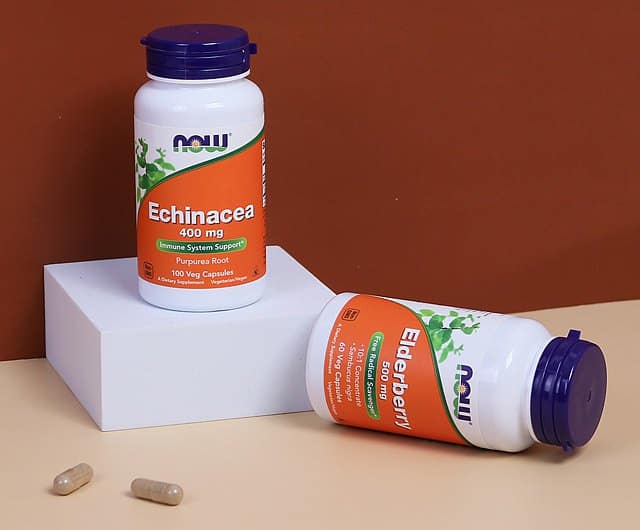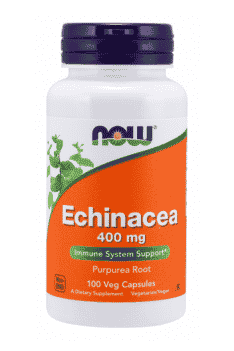You’ve most likely heard of Echinacea, right? It’s the herbal superstar everyone is talking about, particularly when it comes to boosting your immune system. If you live in Europe, North America, or Australia, you’ve probably already heard about this plant-based marvel. In this blog, we’ll be discussing the main health benefits of Echinacea and how it can help you beat the cold and flu season this autumn.
What is Echinacea?

Echinacea isn’t just one thing – it’s a mix of roots and the upper parts of three species: Echinacea purpurea, Echinacea angustifolia, and Echinacea pallida. Echinacea plants contain a wide range of active compounds. These include caffeic acid, alkamides, phenolic acids, rosmarinic acid, polyacetylenes, and many more. These compounds provide various health benefits, including:
- Anti-inflammatory
- Immunomodulatory (immune system modifying)
- Anxiolytic (anxiety-reducing)
- Antimicrobial
- Antiviral
- Antioxidant
Let’s dig into each benefit to understand how Echinacea works to boost your health.
Anti-inflammation
Inflammation is essential for healing and protection because it is our body’s natural defense system. As flu season approaches, the anti-inflammatory effects of Echinacea become increasingly important. While a viral infection causes the flu, the body’s response to the virus is frequently characterised by inflammation. Inflammation can add to the flu’s classic symptoms of fever, muscle aches, and general discomfort.
Although inflammation helps, if it goes rogue and lasts longer than necessary, it increases the risk of chronic illnesses and other health problems. This is where Echinacea shines as a natural medicine. Not only does it strengthen the immune system but it also aids in controlling inflammation.
Immune System Support
Echinacea is well-known for its immune-boosting properties, making it an invaluable ally during the cold and flu season. These supplements contain various bioactive chemicals, such as cichoric acid and echinacoside, which can boost the formation and activity of immune cells, including white blood cells. Echinacea strengthens the immune response, allowing your body to recognise and treat viruses more effectively, lowering your risk of getting colds and flu.
Reduced Severity and Duration of Cold and Flu Symptoms
One of the most notable advantages of Echinacea is its ability to reduce the severity and length of cold and flu symptoms. Numerous studies have shown that Echinacea can be used as a natural medicine to treat symptoms such as sore throat, nasal congestion, and coughing. Its anti-inflammatory characteristics relieve pain, while its immune-boosting properties aid in speedier healing. You may find comfort and a shorter sickness duration by taking Echinacea when symptoms first appear, allowing you to recover more rapidly.
Prevention of Recurrent colds
Echinacea can be particularly beneficial for individuals prone to recurring colds and flu. Furthermore, consistent use of Echinacea has the potential to reduce both the frequency and severity of illnesses, particularly during the challenging cold and flu season. This effect is achieved by forming a protective barrier that makes it more challenging for viruses to infiltrate the body. As a result, Echinacea proves to be a valuable supplement for those seeking a proactive approach to maintaining their health throughout the winter months.
Echinacea is a natural and safe option
Echinacea supplements are a natural and healthy alternative to over-the-counter cold and flu medications. Unlike certain pharmacological choices, people can generally tolerate Echinacea well. As a result, it is a popular choice among individuals who prefer a more holistic approach to managing cold and flu symptoms without the risk of bad reactions. Echinacea’s long history of use and low-risk profile make it an appealing alternative for people looking for a mild yet effective way to treat the cold and flu season.

The suggested dosage of Echinacea is two capsules twice a day. We recommend to consume this product at a low level for up to two weeks per month. Echinacea is not recommended for children under the age of 12.
Research and Studies on Echinacea
Echinacea has been extensively researched, with multiple studies demonstrating its potential in lowering excess inflammation—a critical aspect in general health care. One convincing piece of evidence comes from a mouse study in which echinacea chemicals shown exceptional anti-inflammatory capabilities. These chemicals not only reduced major inflammatory markers, but they also revealed a notable ability to prevent inflammation-induced memory loss.
Numerous research studies have emphasised Echinacea’s potential to boost the immune system’s ability to fight infections and viruses, potentially speeding up recovery from diseases. This is one of the reasons why Echinacea is widely used to prevent or treat the common cold. Furthermore, a review also discovered that Echinacea could cut the chance of acquiring an upper respiratory tract infection by 22%.
Wrap up
As the cold and flu season approaches, Echinacea emerges as a viable natural supplement to consider. Numerous studies have shown that its immune-boosting characteristics have the potential to aid in the fight against infections and viruses, potentially leading to quicker recovery rates. Furthermore, the findings imply that Echinacea may be beneficial in lowering the incidence of upper respiratory tract infections. As we attempt to stay healthy this season, incorporating Echinacea into our wellness routines could be a useful addition to our arsenal against colds and flu.

